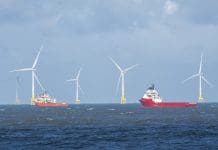Open Access Government examines key global energy topics, focusing on the importance of renewables for energy security, the decarbonisation of Northern Ireland, and funding for NHS trusts to install battery storage systems and solar panels
Open Access Government delves into pivotal global energy topics, highlighting the essential role of renewable energy sources in enhancing energy security worldwide. We also examine the ambitious decarbonisation initiatives underway in Northern Ireland, which aim to reduce carbon emissions and transition to a more sustainable energy future. Additionally, we discuss the vital funding opportunities available for NHS trusts, enabling them to install solar panels and battery storage systems.
Renewables at the core of modern global energy security
In April 2025, the Global Renewables Alliance reported that over 130 companies, investors and industry associations urged governments to redefine energy security for the 21st century, prioritising energy efficiency, renewable energy and system flexibility in national energy policies and plans. They advocate for a smarter, electrified, and decentralised energy system that can withstand shocks and meet growing global demand.
The business case is compelling: in 2022, fossil fuel price volatility caused over $1 trillion in unplanned costs. In contrast, clean energy solutions lower costs and make competitive economies. Since 2000, renewables have saved USD 409 billion in fuel costs and generated up to three times more jobs per dollar compared to fossil fuels. Signatories stressed that prioritising renewable energy is essential for long-term security, prosperity and competitiveness in a rapidly changing world.
“Governments and businesses can now exploit the huge security benefits of a modern, electrified, competitive and flexible system powered by renewable energy,” said Bruce Douglas, CEO of the Global Renewables Alliance, one of the statement’s initiators.
Companies leading the way in industrial decarbonisation are making significant efforts to address this challenge. Decarbonising mining isn’t a far-off vision. It’s profitable and possible. “By switching to renewables, we can significantly reduce operational costs – a clear example of decarbonisation driving profitability and reducing volatility, commented Dino Otranto, CEO of Fortescue Metals.” (1)
New pathway to a decarbonised Northern Ireland
In March 2025, the UK’s Climate Change Committee (CCC) introduced a pathway for a decarbonised Northern Ireland. The target for the Fourth Carbon Budget is a 77% reduction in average annual emissions compared to 1990 levels from 2038 to 2042.
The net costs of reaching Net Zero are estimated to average around 0.2% of GDP per year within this pathway. A significant portion of the required investment, especially in energy supply, electric vehicles (EVs), and heat pumps, is expected to yield operational savings as more efficient electric technologies replace outdated fossil fuel systems.
Devolved authorities may not control all areas of reform. Still, the Executive can promote clean electricity, develop vehicle charging infrastructure, and implement electric heating solutions to advance Northern Ireland’s climate goals. Most investment will likely come from the private sector, although government support is necessary for initiatives like woodland creation and peatland restoration. There are also promising job opportunities in manufacturing and heat pump installation.
The CCC has identified 18 priority recommendations to help Northern Ireland achieve its Fourth Carbon Budget. Key actions include decarbonising the electricity supply, implementing a support scheme for renewable energy similar to those in Great Britain and the Republic of Ireland, addressing regulatory and planning barriers to infrastructure expansion, and ensuring accessible grid connections for renewable sources, EV charging, industry and other low-carbon initiatives. (2)
Funding to install solar panels and battery storage systems
In March 2025, the UK’s Department for Energy Security and Net Zero announced approximately £180 million in funding from Great British Energy to support community clean energy projects across the UK. This investment marks the first significant funding initiative under Great British Energy’s Local Power Plan, designed to implement nationwide clean energy projects.
A key feature of this funding is the allocation of £100 million specifically for NHS trusts to install solar panels and battery storage systems. These projects are expected to significantly reduce energy bills and provide stunning value for taxpayers, contributing to a more energy-efficient and resilient NHS.
Chris Gormley, Acting Chief Sustainability Officer of the NHS, and Fiona Daly, National Deputy Director of Estates for NHS England, are credited as the authors of this announcement. They indicated that the funding will be distributed across 132 projects at 78 NHS trusts in England, impacting around 200 sites. This initiative marks a historic milestone as it is the first dedicated solar investment programme for the NHS. Thanks to the tireless efforts of NHS teams across the country, energy efficiency projects are being implemented, resulting in significant savings.
For instance, Manchester University NHS Foundation Trust is home to the UK’s first net-zero inpatient hospital. Trafford Hospital, known as the birthplace of the NHS, represents a significant advancement for the trust and a symbolic step forward for the entire healthcare system. This project is expected to reduce Trafford’s carbon emissions by 92% by 2040 while saving up to £100,000 annually on energy costs. (3)
Tackling crucial energy challenges
We wish governments, industry associations, and companies success as they address critical global energy challenges worldwide. Integrating renewable energy sources is essential for modern energy security. Efforts to create a decarbonised Northern Ireland reflect a commitment to sustainability. Additionally, securing funding for NHS trusts in the UK to install solar panels and battery storage is crucial for enhancing energy resilience in the NHS.
References
- https://globalrenewablesalliance.org/news/over-130-private-sectororganisations-call-for-renewables-to-be-at-the-core-of-modern-energysecurity/
- https://www.theccc.org.uk/2025/03/19/electric-technologies-will-benefitnorthern-ireland/
- https://www.england.nhs.uk/blog/100-million-funding-from-great-britishenergy-for-nhs-trusts-to-install-solar-panels-and-battery-storage-systems/











